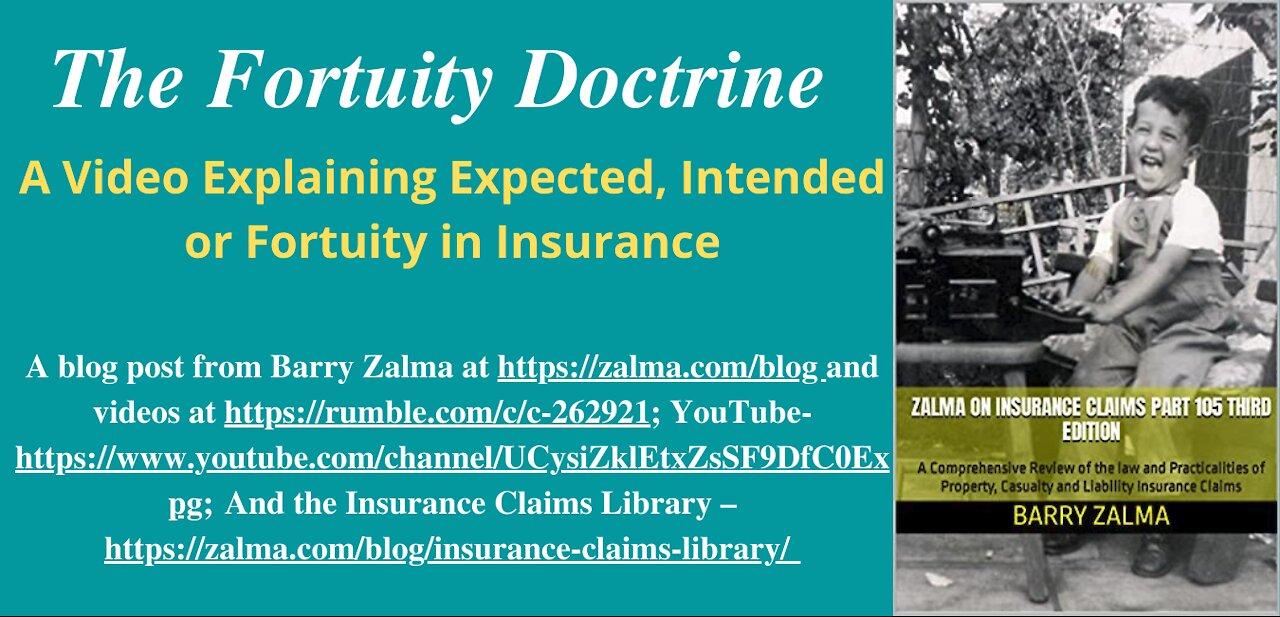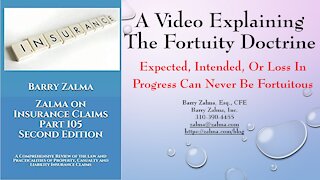Premium Only Content

The Fortuity Doctrine
The Fortuity Doctrine arises from the basic concept upon which insurance is founded: that insurance covers risks, not losses that were planned, intended, or anticipated by the insured. It has always been the view of insurers that losses that were expected by the insured could not be insured. To do so would have a counterproductive effect. No one would buy insurance until they were certain they would have a loss. The concept of spreading the risk on which insurance is based would be defeated.
An accident or occurrence is never present when the insured performs a deliberate act unless some additional, unexpected, independent, and unforeseen happening occurs that produces the damage. when the injury was caused by the insured’s manufacture and sale of products the manufacture and sale of products without right were deliberate and intentional acts, and there were no additional, unexpected, independent, and unforeseen happenings that caused the infringement alleged by the plaintiff or the indemnity obligation. The court concluded that the conduct giving rise to the underlying action was not an “accident” nor an “occurrence” within the coverage provision. because there was no potential basis for coverage, there is no duty to defend.6
The Loss-In-Progress Rule codifies a fundamental principle of insurance law that an insurer cannot insure against a loss that is known or apparent to the insured. (See Bartholomew v. Appalachian Ins. Co. (1st Cir. 1981) 655 F.2d 27, 28-29.) The public policy rule is premised on the view that to hold the insurer liable for a progressive and continuing property loss that was discovered before the carrier insured the risk would be to impose upon the insurer a guaranty of the good quality of the property insured, which liability under the policy the insurer had not assumed. (Greene v. Cheetham (2d Cir. 1961) 293 F.2d 933, 937.)
In Montrose Chemical Corp. v. Admiral Ins. Co. (1995) 10 Cal.4th 645, 691, 693 where the existence and extent of injuries were unknown from the insured’s “standpoint,” coverage of continuous or progressively deteriorating property damage under a CGL policy did not offend the loss-in-progress rule.
The Fortuity Doctrine Or “Loss in Progress” Rule, where damage began to occur prior to the inception of the policy, requires that, as a matter of law, no part of the loss may be insured against. (See E.G., Summers v. Harris, (5th Cir. 1978)573 F.2d 869, 872; Presley v. National Flood Insurers Association (E.D. Mo. 1975) 399 F. Supp. 1242. The Fortuity Doctrine only precludes a party from insuring against a loss that has occurred or is certain to occur within the term of the policy. (See, E.G., Sabella v. Wisler (1963)59 Cal. 2d 21, 34 [27 Cal. Rptr. 689, 377 P.2d 889]; Standard Structural Steel v. Bethlehem Steel Corp. (D.Conn. 1984) 597 F.Supp. 164, 193; Essex House v. St. Paul Fire & Marine Insurance Co. (S.D. Ohio 1975) 404 F.Supp. 978, 988-990; Avis v. Hartford Fire Insurance Company (1973) 283 N.C. 142 [195 S.E.2d 545, 548].)
© 2021 – Barry Zalma
Go to the podcast Zalma On Insurance at https://anchor.fm/barry-zalma; Follow Mr. Zalma on Twitter at https://twitter.com/bzalma; Go to Barry Zalma videos at Rumble.com at https://rumble.com/zalma; Go to Barry Zalma on YouTube- https://www.youtube.com/channel/UCysiZklEtxZsSF9DfC0Expg; Go to the Insurance Claims Library – https://zalma.com/blog/insurance-claims-library/ The last two issues of ZIFL are available at https://zalma.com/zalmas-insurance-fraud-letter-2/ podcast now available at https://podcasts.apple.com/us/podcast/zalma-on-insurance/id1509583809?uo=4
Zalma on Insurance Claims Part 105 Third Edition:
A Comprehensive Review of the law and Practicalities of Property, Casualty and Liability Insurance Claims
by Barry Zalma | Sep 2, 2021
Kindle $9.95 Available instantly
Hardcover , $35.95
Paperback , $25.95
-
 8:36
8:36
Barry Zalma, Inc. on Insurance Law
1 year agoZalma's Insurance Fraud Letter - January 15, 2024
279 -
 14:52
14:52
Barry Zalma, Inc. on Insurance Law
3 years agoThe Fortuity Doctrine
25 -
 16:48
16:48
Barry Zalma, Inc. on Insurance Law
4 years agoA Video Explaining The Fortuity Doctrine & Intentional Acts Exclusions
106 -
 21:18
21:18
Barry Zalma, Inc. on Insurance Law
4 years agoA Video Explaining The Fortuity Doctrine
27 -
 50:42
50:42
Cafeteria Catholics Come Home
3 years agoDoctrine of Salvation
41 -
 22:40
22:40
Cafeteria Catholics Come Home
3 years agoThe Doctrine of Mary
64 -
 20:39
20:39
The Church Split
4 years agoTrinitarian Doctrine - Part 2
371 -
 LIVE
LIVE
Bannons War Room
3 months agoWarRoom Live
14,087 watching -
 LIVE
LIVE
LFA TV
14 hours agoLFA TV ALL DAY STREAM - WEDNESDAY 6/4/25
4,440 watching -
 DVR
DVR
NEWSMAX
3 hours agoThe Gerry Callahan Show LIVE (06/04/2025) | NEWSMAX Podcasts
17.7K